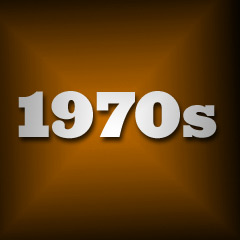
|
![]()
Greatest Films of the 1970s
1970 | 1971 | 1972 | 1973 | 1974 | 1975 | 1976 | 1977 | 1978 | 1979
Title Screen Film Genre(s), Title, Year, (Country), Length, Director, Description 


Aguirre, The Wrath of God (1972, W. Germ/Peru/Mex.) (aka Aguirre, Der Zorn Gottes), 100 minutes, D: Werner Herzog
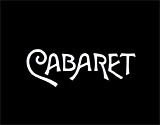


Cabaret (1972), 124 minutes, D: Bob Fosse
Set in a cabaret in sexually-charged, decadent, 1930s pre-war Berlin, director Bob Fosse's masterpiece was one of the greatest musicals ever produced. It was adapted from the Kander-Ebb Broadway stage musical from John Van Druten's play (and movie) I Am a Camera, which, in turn, was based on Christopher Isherwood's Berlin Stories. Young, bisexual Englishman Brian Roberts (Michael York) became involved with free-spirited, promiscuous Kit Kat Club singer and American expatriate Sally Bowles (Liza Minnelli in her first singing role on-screen). Unbeknownst to her, he also shared her with wealthy German baron playboy/homosexual Maximilian von Heune (Helmut Griem). The seedy and sleazy Kit Kat Club was presided over by a sinister, leering, androgynous emcee/master of ceremonies (Joel Grey). After Sally's abortion and the end of her affair, she sang: "Life is a cabaret, old chum, it's only a cabaret, old chum, and I love a Cabaret!" The show 'must go on' night after night as the monstrous Nazis came to power, anti-Jewish persecution and propaganda increased (the subplot of the love affair between Brian's Jewish friends Fritz and Natalia) and the horrors of war appeared on the horizon.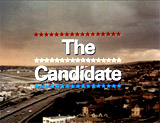
The Candidate (1972), 109 minutes, D: Michael Ritchie

Cries and Whispers (1972, Swe.) (aka Viskingar Och Rop), 106 minutes, D: Ingmar Bergman
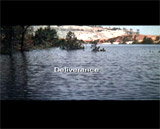


Deliverance (1972), 109 minutes, D: John Boorman
British director John Boorman's gripping, absorbing, action-adventure film was about four suburban Atlanta businessmen-friends who encountered a disastrous rite-of-passage during a summer weekend's river-canoeing trip. The stark, uncompromising film was one of the first to deal with the theme of city-dwellers against the powerful, territorial forces of nature and the wilderness. The exciting box-office hit, most remembered for its banjo dueling and brutal, visceral action (and sexually-violent sodomy scene), was based on James Dickey's adaptation of his own 1970 best-selling novel (his first) of the same name - he contributed the screenplay and acted in a minor part as the town sheriff. The beautifully photographed film (by cinematographer Vilmos Zsigmond), shot entirely on location (in northern Georgia's Rabun County, bisected by the Chattooga River), was the least-nominated film among the other Best Picture nominees. Its famous tagline was: "This is the weekend they didn't play golf." The buddy group, composed of Ed Gentry (Jon Voight), ultra-macho Lewis Medlock (Burt Reynolds), fearful weakling Bobby Trippe (Ned Beatty), and Drew Ballinger (Ronny Cox) faced a nightmarish situation when they came upon the rapids, and local hillbillies who degraded and terrorized them.


The Discreet Charm of the Bourgeoisie (1972, Fr./It./Sp.) (aka Le Charme Discret De La Bourgeoisie), 105 minutes, D: Luis Bunuel
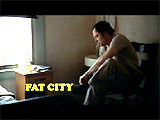

Fat City (1972), 100 minutes, D: John Huston




Frenzy (1972, UK), 116 minutes, D: Alfred Hitchcock
The famed director's tawdry and bleak psychological-horror crime thriller (his only R-rated film with elements of dark humor) told about a serial killer who specialized in gruesomely violent murders by using neckties to strangle his female victims, while a "wrongly-convicted" and desperate fugitive went "on the run." In the film's opening during a political rally being held outside London County Hall, a crowd of bystanders watched as "another necktie murder" corpse floated ashore face-down in the nearby Thames River. A possible suspect was mid-30s ex-RAF serviceman Richard "Dick" Blaney (Jon Finch) - a lower-class, quick-tempered bartender at the Global Public House near Covent Gardens (a district in the West End of London). After being promptly fired (and resigning from his job) after being accused of stealing an early morning drink by his boss, he sought support from the pub's bar-maid - 20-ish co-worker Barbara Jane ('Babs') Milligan (Anna Massey). He also was helped by his suave and affable friend from the pub Bob Rusk (Barry Foster) - a charming, well-dressed ladies man employed as a fruit and vegetable produce wholesaler. Everyone was talking about the most recent "necktie murder" being committed by a "criminal, sexual psychopath." The slightly drunk Richard decided to stop by and visit his ex-wife Brenda (Barbara Leigh-Hunt) of ten years at her successful matrimonial agency - The Blaney Bureau, where their overheated conversation was heard by Brenda's prim secretary Miss Monica Barling (Jean Marsh). Although Brenda was supportive of him, Richard appeared brash and accusatory. However, she invited him out to dinner and charitably slipped him some money into his overcoat. The next day during Miss Barling's lunch break, the chauvinistic Rusk (falsely identified as Mr. Robinson) abruptly entered Brenda's inner office without an appointment, where she reminded him that she had already turned him away from her services due to his strange and creepy sexual issues. After the misogynistic and villainous Rusk turned menacingly personal, in the film's central murder sequence, he revealed himself as the serial killer by viciously and brutally raping and then strangling her with his necktie. After leaving the site of the crime, moments later, Richard Blaney came by to see and thank Brenda, but found the office locked. As he departed, Miss Barling noticed him, and after finding Brenda's dead body inside, reported Richard to the police. Scotland Yard's Chief Inspector Timothy Oxford (Alec McCowen) took over the case, and immediately Blaney became the "wrong man" prime suspect and a fugitive with the help of his girlfriend "Babs." As Richard and "Babs" took steps to evade the authorities, Rusk offered his help to "Babs," and invited her to spend one night in his apartment before she fled from England with Richard to Paris, France. A second much-more restrained 'necktie' rape/strangulation murder of "Babs" took place behind the closed doorway of the killer's 2nd floor (1st floor in the UK) apartment. After her rape and murder, he stashed her nude body in a potato sack bag and loaded it into the back of a truck (bound for Lincolnshire that evening). However, later in the evening, he became distressed noticing that his tie-pin from his jacket's lapel was missing - and flashbacked to remember how "Babs" had grabbed at it during her assault. During a very claustrophobic and tense sequence in the back of the moving, jostling and swerving truck, Rusk was eventually able to extract his tie-pin from "Babs'" clenched fingers and escape from the truck when the driver briefly stopped at a cafe. Once "Babs'" body was identified, Blaney was again targeted. Although Blaney's friend Rusk offered assistance to let him hide out at his place, he reported Blaney to the police and he was arrested. Blaney was tried in court and found guilty - all the while protesting his innocence and blaming Rusk for the crime. Meanwhile, Inspector Oxford began to have doubts about Blaney's guilt, and was aided by evidence at the trucker's cafe pointing to Rusk's clear involvement in the death of "Babs." Intent on seeking revenge and killing Rusk, Blaney escaped from a prison ward hospital and proceeded to Rusk's apartment to kill him. At the same time, Inspector Oxford was alerted to his escape and anticipated where he might go. In Rusk's unlocked apartment in the film's conclusion, Blaney discovered Rusk's next dead and strangled female body covered up in his bed. Oxford arrived at the same moment and it looked grim for Blaney, but then they both heard noises of Rusk returning to his place with a heavy trunk to transport his newest victim away. Oxford confronted Rusk and asked with a clincher line of dialogue: "Mr. Rusk, you're not wearing your tie."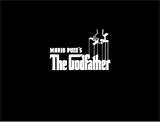


The Godfather (1972), 175 minutes, D: Francis Ford Coppola
Director Francis Ford Coppola's operatic, violent Best Picture-winning drama was based on Mario Puzo's novel of the same name. It was a bravura, genre-defining, epic-length Mafia/gangster classic that evoked the mid and late 1940's period with powerful character development, lighting, costumes, and settings. Flawless performances came from an all-star cast, a dramatic plot, Nino Rota's unforgettable music, violent set-pieces, and the grotesque severed horse-head scene. The film followed the fortunes of the fictitious Corleones, a powerful Mafia family with its own family rituals and separate code of honor, revenge, justice, law and loyalty that transcended all other codes. When Godfather Don Corleone (Marlon Brando) was shot by rivals, his sons Sonny (James Caan), Fredo (John Cazale) and favorite young son Michael (Al Pacino) assumed control, with Michael ascending to a prominent position of power.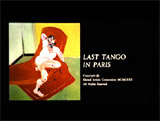


Last Tango in Paris (1972, It./Fr.), 125 minutes, D: Bernardo Bertolucci
Bernardo Bertolucci's controversial, landmark X-rated (or NC-17) film initiated a trend for arthouse films to include explicit erotic content. It told about a primal sexual affair between middle-aged, bitter and grieving hotel owner Paul (Marlon Brando in his seventh and last Best Actor-nominated role) whose wife had committed suicide and a 20-year old French student Jeanne (Maria Schneider) who was engaged to be married to Tom (Jean-Pierre Léaud), a film director who was making a cinema verite film about her. Upon meeting in an apartment both are looking to rent, Paul forces himself violently on Jeanne sexually, bordering on rape, and begins a torrid, sexually perverse but anonymous 'no questions asked' affair with her (they don't know each other's names) that becomes increasingly vile, unromantic and scatological. His set of rules was notable for the time: "We are going to forget everything we knew - everything". The pure sexual nature of their relationship included the bathtub washing scene and the infamous, disturbing, and explicit sodomy (butter-lubricated anal sex) scene on the floor ("Get the butter"). Later, Paul reciprocated by letting Jeanne penetrate him anally with her fingers - part of his objective to "look death right in the face...go right up into the ass of death... till you find the womb of fear." Predictably, the film ended with his violent death on the balcony when she shot him with her father's gun.

Play It Again, Sam (1972), 85 minutes, D: Herbert Ross
Woody Allen's funny classic was about a recently-divorced SF film critic who began dating again while being coached by a ghost-like Humphrey Bogart (from the film Casablanca) - Allen wrote the original screenplay for the Broadway play, and then atypically had Herbert Ross direct the film. SF film magazine critic Allan Felix (Woody Allen) watched a theatrical screening of Casablanca (1942) with his mouth agape during the famed airport farewell conclusion sequence, and then remarked (in voice-over) as he walked out: "Who am I kidding? I'm not like that. I never was, I never will be. That's strictly the movies." He was portrayed as a self-professed, insecure, depressed "aspirin junkie" and neurotic individual. In a flashbacked scene, Allan (very depressed and with low self-esteem) recalled how he had broken-up with his wife Nancy Felix (Susan Anspach) after two years of marriage. As he sat in his room, Allan was counseled about being a tough, self-confident, desirable and virile man, about how to treat dames, and was also given cheesy, hard-boiled romantic advice by the trench-coated ghost of Humphrey Bogart (flawlessly interpreted by Jerry Lacy). His best friends were workaholic and obsessed businessman Dick Christie (Tony Roberts) (the running joke was that he often called his office and left messages to report his whereabouts, i.e., "This is Mr. Christie, I'm at The Hong Fat Noodle Company...") and his neurotic wife Linda (Diane Keaton), a model, who both wanted Allan to succeed in dating women. Allan was about to experience many disastrous and fumbling blind date scenes and rejections, the bulk of the film's content. Over time, with the increased amount of time Allan spent being advised by Linda, the two began to fall in love. During a romantic dinner date with Linda in his apartment, Bogart coached Allan to kiss her. Although his first attempt was bungled, and Linda stormed off, she soon reappeared - to profess her love: ("Did you say you loved me?"), and to wildly and ecstatically kiss and embrace him. Later at 7 am the next morning, they were in bed together recalling their sexual experience. Feeling guilty, he told her that they should probably reveal their love affair to her husband Dick. Allan's fanciful and over-active imagination envisioned three different possibilities or scenarios of how badly the betrayed Dick would receive the news of his affair with his wife Linda. In the film's final moments, Dick, Linda, and Allan were brought together to cleverly re-enact and reprise the airport scene from Casablanca (between Rick and Ilsa). Allan realized Linda still truly loved her husband; he decided to give up his beloved Linda and urge her to get on a plane to Cleveland with Dick. He was able to spout lines from his favorite film, and also realize that he had a newfound ability to attract women. He would no longer need Bogart and the two said farewell - with Bogart's ending line: "Here's looking at you, kid."



Pink Flamingos (1972), 93 minutes, D: John Waters
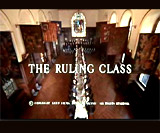


The Ruling Class (1972, UK), 148 minutes, D: Peter Medak
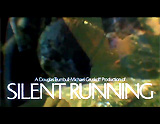

Silent Running (1972), 89 minutes, D: Douglas Trumbull
Douglas Trumbull's directorial debut film was a low-budget, groundbreaking, classic sci-fi environmental-message movie with its speculative vision of a dystopic eco-disaster, and the results of ecological preservation in space; the environmental disaster story with a socially-conscious message told of efforts to locate new planets to populate or terraform, and the eventual goal to return carefully-tended plants to Earth for reforestation. Non-conforming hippie loner and botanist-ecologist Freeman Lowell (Bruce Dern), part of a three-man crew, was onboard the USS Valley Forge; it was one of a fleet of eight converted and orbiting space-freighters (sponsored by American Airlines) in outerspace circling around Saturn; Lowell was cultivating and tending to the last remaining plant specimens stripped from a radiation-devastated planet Earth - he cared deeply for the plants within the forest ecosystem inside a transparent, pressurized greenhouse geodesic biodome attached to the ship - one of the freighter's six domes. Maintenance for the ship was provided by three beautifully-designed, faceless, silent, ecologically-friendly, anthropomorphic drones or robots with short legs, originally with dull names: Drone # 1, Drone # 2, and Drone # 3. An important transmission from Con Central ordered the Valley Forge to begin the next morning "to abandon, then nuclear destruct all the forests, and return our ships to commercial service" - it meant jettisoning and destroying all of the geodesic greenhouse domes. After the threesome prepared to detonate their own freighter's domes, the agitated Lowell became visibly angry after four of the six Valley Forge domes were jettisoned six miles out and destroyed with nuclear charges. Upset and crazed, Lowell rebelled and refused to allow any more domes to be destroyed, and decided to save the animals and plant life and refoliate Earth with the last surviving vegetation. He murdered crewmate John Keenan (Cliff Potts), and killed the two other crewmen, Marty and Andy, by trapping them in the second-to-last dome - he jettisoned the dome with them inside before it exploded; now, there was only one remaining forest dome. Lowell then reported that his damaged ship was uncontrollably accelerating toward Saturn, and that his crewmates had been accidentally ejected in the dome and blown up. Lowell reprogrammed the three innocent and protective robots to answer and respond to him only. Unfortunately during rough passage through Saturn's rings, Drone # 3 was lost. He renamed the drones after Donald Duck's nephews: # 1 became Dewey (grayish-blue) and # 2 became Huey (orange); # 3 (green) was posthumously renamed Louie. The drones would function as Lowell's new family of pet-like "boys," playing poker with him, but would still perform their accustomed duties to provide maintenance for the ship. He taught them how to plant trees and tend to the biodome. One day, he noticed signs that the biodome was mysteriously dying and the plants were inexplicably wilting and turning brown. Becoming frantic, he drove in a motorized buggy to the biodome to meet with Huey, and carelessly struck and seriously damaged the robot in one of the ship's corridors. He felt awful for not being able to repair Huey's extensible arm, and for his dying forest. Unexpectedly, the nearby sister ship-freighter, the Berkshire, radioed and him reported on their rescue mission; he feared that his sabotage of the mission would eventually be discovered when picked up in 6 hours. He also suddenly realized the biodome was dying due to lack of light on the far side of Saturn. He installed a series of bright artificial arc lights-lamps in the dome and then made a fateful decision. Dewey would remain in the jettisoned well-lit dome to tend, take care of, and maintain the forest plants, while he and Huey would self-sacrificially prepare nuclear charges to destroy the Valley Forge. After the Valley Forge was obliterated with nuclear charges, Dewey was seen drifting off into the cosmic darkness of deep space, but was successfully caring for the forest of young trees in the brightly-lit biodome (using Lowell's old-fashioned, colorful, battered watering can).



Sleuth (1972, UK), 138 minutes, D: Joseph L. Mankiewicz

Solaris (1972, Soviet Union) (aka Solyaris, or Солярис), 165 minutes, D: Andrei Tarkovsky

Sounder (1972), 105 minutes, D: Martin Ritt



Super Fly (1972), 93 minutes, D: Gordon Parks, Jr.
Gordon Parks' son directed this action-crime blaxploitation drama - one of the best of its type. It included a funky Curtis Mayfield score (that successfully outgrossed the film itself!) with the hit singles Pusherman and Freddie's Dead. The film was notable as the first to be financed by two African-American businessmen (and the director), and made by a mostly-black crew filming on-location. It starred Ron O'Neal as flashy-dressing NYC cocaine drug-dealer Youngblood Priest, aka Super Fly, who was out to complete one last underworld drug deal or score in Harlem before going straight. Although rich, admired, and with many materialistic luxuries, the flamboyantly-stylish Priest was also glorified as a drug pusher, living in a corrupt world where even the Deputy Police Commissioner ("The Man") was crooked, but was outwitted by Priest in the final scene.